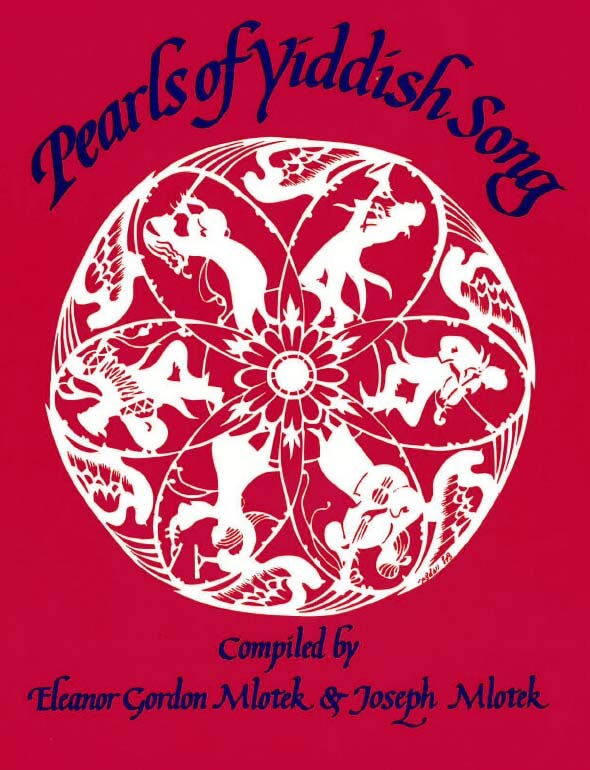A parody of an older religious song “Meyerke, mayn zun” (Meyerke, my son) with the same melody. The parody is part of the repertoire of Emil Gorovets,.
In some of the parody’s versions, the son’s name is also Meyerke. “Meyerke” is one of two Yiddish songs that composer Maurice Ravel arranged for voice and piano (the other is “Di alte kashe” [The old question]).
In the Soviet-Yiddish collection by Y. Dobrushin and A. Yuditski, the dialogue is between a mother and son. The son says that the girl he loves is a young “komsomolotshek” (member of the Communist youth organization), that her nadn (dowry) consists of her two golden hands, and that Stalin and Kallnin will bless them at their wedding.

— Nokhemke, my son, why are you so sad?
— I love a pretty girl, father.
— And who is this girl, my son?
— She’s a fine girl, father.
— And how big is her dowry, my son?
— She has no dowry, father.
— I don’t like this match, my son!
— No one asked your opinion, father.
— I won’t come to your wedding, my son.
— You’ll come to the circumcision, father.
— When is the wedding, my son?
— I’ll send your grandson to tell you, father.
— Nokhemke, mayn zun, Nokhemke, mayn zun,
Oy, Nokhemke, mayn zun,
Vos bistu azoy troyerik, Nokhemke, mayn zun?
— Kh’hob lib a sheyn meydele, tatenyu.
— Un ver zhe iz dos meydele, zunenyu?
— S’iz a fayn meydele, tatenyu.
— Un vifl git zi nadn, zunenyu?
— Keyn nadn git zi nit, tatenyu.
— Es gefelt mir nit der shidekh, zunenyu!
— Me fregt bay dir keyn deyes nit, tatenyu.
— Ikh vel nit kumen oyf dayn khasene, zunenyu!
— Vest kumen tsum bris, tatenyu.
— Ven zhe iz di khasene, zunenyu?
— Ikh vel shikn nokh dir dos eynikl, tatenyu.
— נחומקע, מײַן זון, נחומקע, מײַן זון,
אױ, נחומקע, מײַן זון,
װאָס ביסטו אַזױ טרױעריק, נחומקע, מײַן זון?
— כ’האָב ליב אַ שײן מײדעלע, טאַטעניו.
— און װער זשע איז דאָס מײדעלע, זונעניו?
— ס’איז אַ פֿײַן מײדעלע, טאַטעניו.
— און װיפֿל גיט זי נדן, זונעניו?
קײן נדן גיט זי ניט, טאַטעניו.
— עס געפֿעלט מיר ניט דער שידוך, זונעניו!
— מע פֿרעגט בײַ דיר קײן דעות ניט, טאַטעניו.
— איך װעל ניט קומען אױף דײַן חתונה, זונעניו!
— װעסט קומען צום ברית, טאַטעניו.
— װען זשע איז די חתונה, זונעניו?
— איך װעל שיקן נאָך דיר דאָס אײניקל, טאַטעניו.
Song Title: Nokhemke Mayn Zun

First published in 1988 as Pearls of Yiddish Song: Favorite Folk, Art and Theatre Songs, this anthology contains 115 songs. Some material had never been published, while others, included in rare song collections or sheet music, were largely inaccessible. The songs presented reflect Jewish life in Eastern Europe and the United States and depict childhood, love, family celebrations, poverty, work and struggle. There are also songs from the Hasidic and Maskilic movements, songs of Zion and of America, as well as songs from the Yiddish theater.
The title of this anthology derives from the weekly two-page feature column “Pearls of Yiddish Poetry,” which the compilers Yosl and Chana Mlotek initiated in 1970 in the Yiddish newspaper Der Forvertz (the Yiddish Daily Forward). Hundreds of readers from around the world — including authors, composers, singers, actors — became co-participants in this collective folk project and recalled melodies, lines, fragments, stanzas and their variants of songs, poems, and plays which they had heard in their youth. At first, readers sent in only written material. Later, they also taped songs on cassettes, many of whose melodies had, until then, never been recorded. They also identified and supplied missing information regarding lyricists, poets, and composers and described the circumstances surrounding the songs’ origins, their dissemination, diffusion and impact.